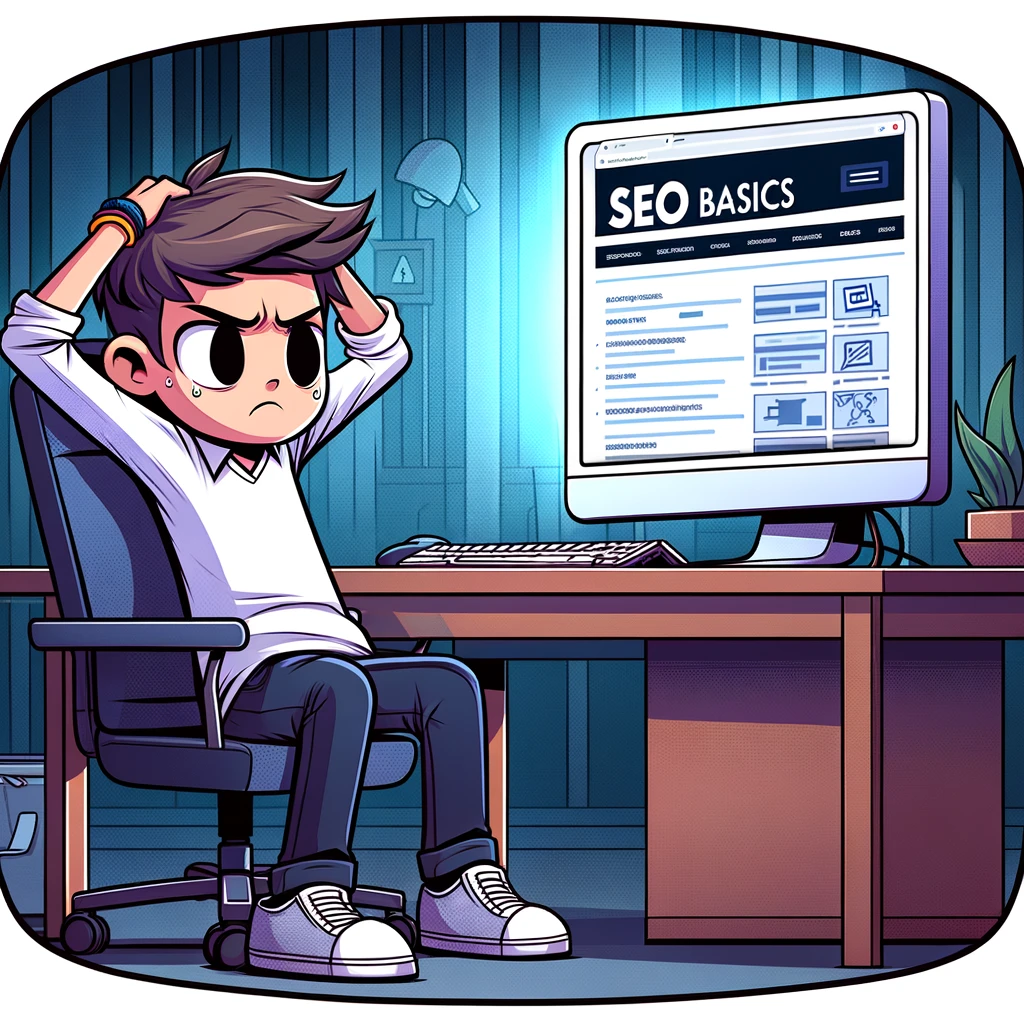Starting your journey as a new site owner can be as exciting as it is daunting, especially when you dip your toes into the world of Search Engine Optimization (SEO). The sheer volume of strategies, tools, and advice available can quickly lead to SEO overwhelm. However, with a structured approach, you can demystify SEO and start improving your site’s visibility in no time. Here’s how you can manage SEO overwhelm and lay a solid foundation for your website’s success.
Understand What SEO Is and Isn’t
SEO is a set of practices designed to improve the positioning of your web pages in organic search results. At its core, SEO is about making your website more user-friendly and providing value through your content, which in turn makes it more favorable to search engines like Google.
It’s important to recognize what SEO isn’t: it’s not a magic wand that will skyrocket your rankings overnight. Instead, it’s a long-term strategy that requires patience, persistence, and a lot of learning.
Start with a Solid Foundation: The Basics of SEO
Before diving into complex strategies, make sure you understand and implement the basics of SEO. These include:
1. Keyword Research
Identify the terms and phrases that your target audience uses to search for your products or services. Tools like Google Keyword Planner or Ubersuggest can help you find relevant keywords. Focus on long-tail keywords, which are less competitive and more specific, making them easier to rank for.
2. On-Page Optimization
This involves optimizing individual web pages to rank higher in search engines. Make sure your titles, headers, and meta descriptions include relevant keywords. Optimize your images by compressing them and using alt tags. Ensure that your URL structure is clean and descriptive.
3. Quality Content
Create content that is informative, engaging, and valuable to your audience. Good content is the cornerstone of effective SEO. It should solve problems, answer questions, or provide insights that are unique to your niche.
4. Site Speed and Mobile Optimization
A slow website can hurt your rankings and user experience. Use tools like Google PageSpeed Insights to analyze and improve your site’s loading speed. Additionally, ensure your website is mobile-friendly, as a significant portion of web traffic comes from mobile devices.
Prioritize and Plan
Tackling all aspects of SEO at once can be overwhelming. Instead, prioritize tasks based on their potential impact and your website’s specific needs. Create a realistic timeline and set goals for what you want to achieve in the short and long term. This could look like aiming to optimize all existing content for keywords within three months or working to improve mobile usability in the next quarter.
Learn Continuously
SEO is ever-changing, with search engines constantly updating their algorithms. Stay updated by following reputable SEO blogs, forums, and news sources. Websites like Moz, Search Engine Journal, and Google’s Webmaster Blog provide valuable insights and tips that are essential for keeping up with the trends.
Use the Right Tools
Leverage SEO tools to streamline your efforts and get better insights. Google Analytics, for instance, helps track your website’s performance and user engagement. SEMrush or Ahrefs can provide comprehensive keyword research, competitive analysis, and more. Many of these tools offer free versions or trials that are sufficient for beginners.
Monitor and Adjust
Regularly check your SEO performance and adjust your strategies as needed. Monitor your keyword rankings, backlink profile, and web traffic. Use what you learn to tweak your tactics, whether it’s revising your keywords, updating content, or improving your site’s technical SEO.
Connect with a Community
Join SEO communities online to connect with other webmasters who can provide support and advice. Platforms like Reddit’s r/SEO, SEO forums, and LinkedIn groups are great places to ask questions and learn from experienced SEO professionals.
Delegate When Needed
If SEO becomes too overwhelming, consider delegating tasks to freelancers or agencies. They can handle complex aspects like link building and technical SEO audits while you focus on content creation and other business priorities.
Keep a Balanced Perspective
Finally, keep a balanced perspective on SEO. While it’s crucial for your site’s visibility and success, it’s just one part of running a successful website. Don’t let SEO tasks overshadow other important aspects like product development, customer service, and community engagement.
By breaking SEO down into manageable steps, continually learning, and using the right tools, you can effectively manage SEO overwhelm and gradually improve your site’s visibility. Remember, SEO is a marathon, not a sprint. Stay patient, stay persistent, and you will see results.

Leverage Local SEO
If your business has a physical location or serves a specific geographic area, local SEO can be incredibly beneficial. Start by ensuring your business is listed on Google My Business; this helps in appearing in local search results and Google Maps. Optimize your profile by adding a thorough description, working hours, and photos. Encourage satisfied customers to leave positive reviews, as these can boost your visibility and credibility.
Harness the Power of Social Media
Social media doesn’t directly influence SEO rankings, but it can significantly amplify the reach of your content and increase your website’s traffic. Regularly share your content on social media platforms where your audience spends their time. Engage with followers by responding to comments and messages. This can drive more traffic to your site, which indirectly benefits your SEO efforts by demonstrating your site’s relevance and popularity to search engines.
Focus on User Experience (UX)
SEO is not just about optimizing for search engines; it’s equally about optimizing for the people visiting your site. A site with excellent user experience can lead to longer visit durations and lower bounce rates, which are positive signals to search engines. Ensure your website is easy to navigate, has a clean and functional design, and delivers content in an engaging manner. Also, make sure that your website is accessible to all users, including those with disabilities, which can be achieved by adhering to web accessibility standards.
Understand the Role of Backlinks
Backlinks — links from other websites to yours — are among the strongest signals to search engines about the credibility and authority of your content. However, focus on quality over quantity. Earn backlinks from reputable sites within your industry by creating share-worthy content and engaging in community or industry discussions. Avoid any strategies that involve purchasing links or participating in link schemes, as these can lead to penalties from search engines.
Implement Structured Data
Structured data is a way to format HTML that uses a specific vocabulary, telling search engines how to interpret content and how to display it in the search results. Using schema markup can help boost your visibility in rich snippets and other enhanced search results features. This can increase your click-through rates and bring more traffic to your site. Tools like Google’s Structured Data Markup Helper can assist you in implementing this.
Continuous Learning and Adaptation
SEO is dynamic, with search engine algorithms continually evolving. What works today may not work tomorrow, so it’s crucial to stay agile and adapt your strategies as the industry changes. Subscribe to SEO newsletters, attend webinars, and consider taking courses that can deepen your understanding and keep you informed about the latest trends and best practices.
Set Realistic Expectations
While it’s important to aim for the top rankings, SEO can be highly competitive depending on your niche. Set realistic expectations and understand that SEO growth is typically gradual. Celebrate small victories, like an increase in organic traffic or improvement in keyword rankings, as these incremental gains can lead to significant benefits over time.
Conclusion
Dealing with SEO overwhelm as a new site owner is about simplifying complexities and taking things one step at a time. Start with the basics, use the right tools, and continuously educate yourself. By systematically implementing SEO practices, you will not only improve your site’s search engine rankings but also enhance the overall user experience. Remember, SEO is a long-term investment in your site’s future visibility and success. With patience and persistence, you’ll find that the initial overwhelm gives way to excitement as you start seeing results.
References:
- Google Keyword Planner: https://ads.google.com/home/tools/keyword-planner/
- Ubersuggest: https://neilpatel.com/ubersuggest/
- Google PageSpeed Insights: https://developers.google.com/speed/pagespeed/insights/
- Moz: https://moz.com/
- Search Engine Journal: https://www.searchenginejournal.com/
- Google’s Webmaster Blog: https://webmasters.googleblog.com/



